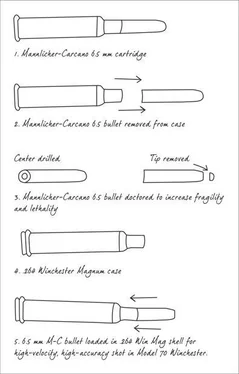Stephen Hunter - The Third Bullet
Здесь есть возможность читать онлайн «Stephen Hunter - The Third Bullet» весь текст электронной книги совершенно бесплатно (целиком полную версию без сокращений). В некоторых случаях можно слушать аудио, скачать через торрент в формате fb2 и присутствует краткое содержание. Жанр: Триллер, на английском языке. Описание произведения, (предисловие) а так же отзывы посетителей доступны на портале библиотеки ЛибКат.
- Название:The Third Bullet
- Автор:
- Жанр:
- Год:неизвестен
- ISBN:нет данных
- Рейтинг книги:5 / 5. Голосов: 1
-
Избранное:Добавить в избранное
- Отзывы:
-
Ваша оценка:
- 100
- 1
- 2
- 3
- 4
- 5
The Third Bullet: краткое содержание, описание и аннотация
Предлагаем к чтению аннотацию, описание, краткое содержание или предисловие (зависит от того, что написал сам автор книги «The Third Bullet»). Если вы не нашли необходимую информацию о книге — напишите в комментариях, мы постараемся отыскать её.
The Third Bullet — читать онлайн бесплатно полную книгу (весь текст) целиком
Ниже представлен текст книги, разбитый по страницам. Система сохранения места последней прочитанной страницы, позволяет с удобством читать онлайн бесплатно книгу «The Third Bullet», без необходимости каждый раз заново искать на чём Вы остановились. Поставьте закладку, и сможете в любой момент перейти на страницу, на которой закончили чтение.
Интервал:
Закладка:
Cord was a toot and a half, believe me. I still have dreams and nightmares about him; I’ll never escape him. Perhaps you know the story: he was one of the most famous men the Agency ever produced, and, I would say, having known most of them, the best. He was thrice touched by fire when I went to work for him in 1961. He had first of all lost an eye as a marine officer in the Pacific. Cord never discussed it, but we are given to understand that he saw the hardest of hard combat, even the gory squalor of hand-to-hand with bayonet and entrenching tool against a desperate enemy. Cord was too diffident to wear an eye patch, knowing that it would make him too famous too young. He simply slipped a glass orb in the vacant socket, and only a man studying him would notice. It was the idea of the eye gone on Iwo or Entiwok or one of those god-awful, never-heard-of-again places that was far more powerful than a showy patch would have been.
His background after the war is probably pertinent. He emerged a pacifist, having seen too many bayonets crammed into the bellies of teenage boys who’d never gotten around to getting laid. He was attracted to the idea of one-world government, so that nations wouldn’t send fleets of boys with bayonets after one another on flyspecks in far oceans. He was active in the United Nations movement and labored sweatily in service to that dream. Somehow, around 1948, after three years of hard work, it dawned on him that the whole outfit had been infiltrated and taken over by Commies and that it would henceforth work exactly the opposite of its intended mission – that is, it had come to exist to enforce the hegemony of the red over the blue. Disillusioned, he made contact with Mr. Dulles, who, duly impressed, offered him a position.
He had a talent, a nose for it. Within five years he became head of Clandestine Services, in the Directorate of Plans, and if you don’t yet know, Clandestine was where it all happened, a hatchery for mayhem. Other outfits would call such a unit “Operations,” and it would acquire flashy nicknames like “The Ranch” or “The OK Corral,” and its operatives would be called “cowboys” or “gunslingers” or some such. It never looked as deadly as it was: a bayful of mild-looking Yalies (a few Princetonians and Brownies thrown in, the odd nonpedigreed genius with special skills) with narrow ties (never loosened), horn-rims or black-framed heavy plastics, Brooks Brothers dark gray or summer-tan suits, Barrie Ltd. pebbled brogues or loafers, as dull as the Episcopal ministry. On weekends, a lot of madras, rather lurid Bermudas (red was popular, I recall), old Jack Purcell tennis shoes, usually battered orange by clay courts, khakis, old blue button-downs, maybe an old tennis shirt. Little would one know that behind those bland eyes and smooth faces lurked minds that plotted the downfalls and upswings of tyrants, the murders of secret-police colonels, an invasion or two, and a coup or three.
Back to Cord, wizard of Clandestine. His second immersion in flame was not cool or enviable. It was awful. In 1958 he lost his second child, a nine-year-old son, who was fatally hit by a car in, of all places, the spiritual home of all us Yalies waging the Cold War, Georgetown. The loss of a child is something I cannot fathom. As emotion embarrasses me, I will not linger on it, nor try to conjure its effects on him. It cannot have inclined him to a merry view of the universe.
It was his third tragedy that made him famous, pitied, beloved, scorned, doubted, mistrusted, suspected, and yet somehow vivid. He was, in his way, a pre-George Smiley Smiley, in that his public cuckolding served allegorically for the earnestness with which he loved his country and the disdain with which it repaid him. The name of his disaster was Mary Pinchot Meyer.
I suppose she could be termed a transitional woman. She came too late to be called a beatnik and too early to be called a hippie. “Well-bred bohemian,” though it has no public cachet, is probably the most accurate term. It goes without saying that she was beautiful, that she had the social ease being well bred confers upon its progeny (why do I insist on “progeny” instead of “children”? fancy again!), that she had beautiful flashing legs, that most everybody fell in love with her, that she was witty, effervescent, charismatic, that she had a great mane of hair, tawny and thick, and that lipstick looked redder on her than on any woman in Washington. She must have been sexually precocious, she must have loved danger, she must have had in her the seedlings of feminism and a need to be a person outside the illustrious reign of her husband as warrior-king of the Cold War and smartest of the very smart people who coagulated in then-seedy, dumpy, but somehow glamorous-amid-the-rot Georgetown.
She left him in 1961, citing the usual suspect of that age, the catch-all “mental cruelty,” whatever that meant, and I suppose it means anything its attorneys want it to mean. Did she begin her famous affair before or after the divorce? Was Cord officially cuckolded, or did the two lovebirds have the courtesy to keep it legal until the papers were served? No one will ever know, and it’s doubtful that Cord ever told anyone. He never told me.
The two were Georgetowners before 1960. It is known that she was friendly with and passed time with his gorgeous if slightly vague wife. Moreover, they must have seen each other in the streets, perhaps at the grocery, perhaps at the various drunken lawn parties to which their set, our set, “the” set seemed to gravitate, all the bold young shapers of the future, all the technocrats of the fashionable agencies (and our agency was very fashionable, while the poor boobs of the FBI were not), and all the young, ambitious journos who would write books about us and end up richer and more powerful than any of us.
It is not known when Mary Pinchot Meyer began to sleep with John Fitzgerald Kennedy, before the November 1960 election or after; nor if they waited till the divorce was final. But have at it they did, and she is credited with at least thirty visits to the White House during his three years, at many odd times of day or night. It was such a terribly kept secret in the Washington of the era that it could hardly be called a secret at all, although perhaps she was most in the dark, for she may never have quite caught on to the fact that if he was sleeping with her, he was in the meantime trying to bed every vagina between Baltimore and Richmond, with the odd movie-star bang thrown in for good measure. Other rumors swelled in the wake of the two. She had some mysterious connection to the least interesting man of the period, Timothy Leary (Harvard, of course! agh!). So it was said that she brought LSD and marijuana into the White House and introduced the president to them, in hopes of somehow lessening his childish aggression. Apologies, I have no inside dope on this and mention Mary only because she was part of Cord’s glamour and because this was one more reason why Plans – not the Agency as a whole, as there is no Agency as a whole, only a loose confederation of tribes, some of whom get along and some of whom do not – was not a big Kennedy supporter.
Possibly I will address that later; let me just assure you that as far as I am concerned, sexual jealousy was not part of the equation – it would not be recognized under the New Criticism – and that I, little Hugh, latest of Cord’s Yale wonder boys, was not secretly in love with Mary. I always loved Cord, I never loved Mary (and let me hasten to add, I had NOTHING to do with her murder in 1964 or whenever it was); I did what I did for the dreariest of reasons – a policy dispute. Again, you’ll have to suffer my fancy for prose another few pages before I discuss that.
So I did not murder JFK to punish him for sleeping with Mary Pinchot Meyer, the former wife of my boss and mentor and a far better man, in all respects, than he was. Too bad; it would give a nice spin to what follows, would it not, if the assassin of Camelot turned out to be the noblest of them all, and the man he slew the rankest of dogs? It would turn popular history, where by default I am the most hated of all men on Earth, on its ear. The truth is, I never saw or met Mary; she was only a ghost, a whisper, a legend. As I said: I did it for the policy.
Читать дальшеИнтервал:
Закладка:
Похожие книги на «The Third Bullet»
Представляем Вашему вниманию похожие книги на «The Third Bullet» списком для выбора. Мы отобрали схожую по названию и смыслу литературу в надежде предоставить читателям больше вариантов отыскать новые, интересные, ещё непрочитанные произведения.
Обсуждение, отзывы о книге «The Third Bullet» и просто собственные мнения читателей. Оставьте ваши комментарии, напишите, что Вы думаете о произведении, его смысле или главных героях. Укажите что конкретно понравилось, а что нет, и почему Вы так считаете.












